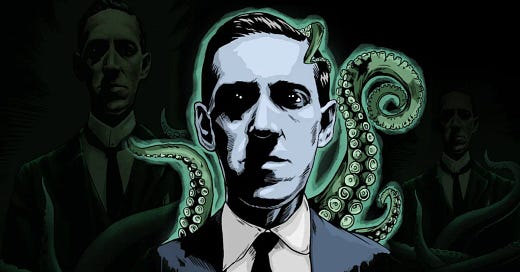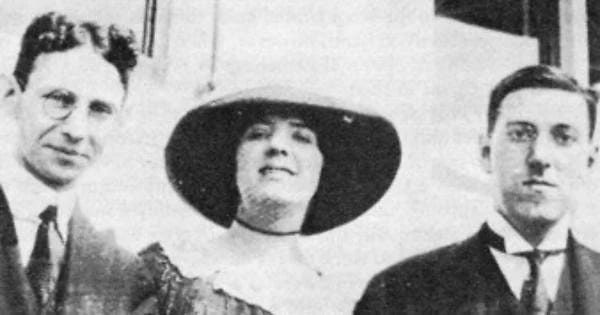On this day, August 20, 1890, Howard Phillips Lovecraft was born in his beloved Providence, Rhode Island. His parents, Winfield Scott Lovecraft and Sarah Susan Phillips, imparted to him a hereditary taint. Winfield was committed to the Butler Hospital following a psychotic break in a Chicago hotel room. Winfield would die in the mental ward in 1898, the likely victim of late-stage syphilis. Mother Sarah would follow a similar path, being committed to Butler in 1919. On May 24, 1921, Mother Sarah, affectionally known as Susie, died at Butler. Cause of death: complications following gallbladder surgery.
Young Lovecraft grew up an imaginative loner. He was what more contemporary mouths would call a “loser.” His family wallowed in genteel poverty for most his life. Following several nervous collapses, Lovecraft ended his schooling before he could graduate high school. This failure meant that he could not attend nearby Brown University. This embarrassment haunted Lovecraft for years, forcing him into an internal exile that only ended when he sent a letter to the pulp magazine Argosy. The unknown young man from Providence excoriated Fred Jackson, one of the top contributors to the magazine. Lovecraft’s criticism and the responses sparked something. From then on, he became a man of the pen.
Still, the taint of the weirdo—the oddball kid with the mental patient parents—could not be overcome so easily. Lovecraft the writer toiled in the pulps. He wrote for Weird Tales and other magazines that the snobs considered the literary gutter. Even worse for the sensitive Old Man of Providence, many of his best tales were rejected. Unlike more professional pulp craftsmen, Lovecraft took rejections hard. More often than not, Lovecraft saw rejection as a commentary on his work and person, and thus many of his masterpieces were shelved for years following a single editorial decision. To make money, Lovecraft ghostwrote for others, including the famous magician Harry Houdini. Some of these ghostwritten tales were more popular than Lovecraft’s originals, or at least they were during HPL’s lifetime.
Lovecraft had friends. He had even more pen-pals. Some of these pen-pals went on to become excellent writers in their own right, such as Robert Bloch. Lovecraft was fond of visiting his friends. Indeed, he was fond of traveling in general. The man so often labeled a “recluse,” spent the late 1920s and early 1930s traveling all over the United States and Canada. He visited Vermont, New Hampshire, Massachusetts, Maine, New York, Connecticut, Cleveland, Ohio, Florida, New Orleans, and Quebec. There was something of the flâneur in Lovecraft. His ample amount of leisure time meant that he could do what he pleased when he pleased.
Mostly, Lovecraft wrote. His marriage to the Ukrainian immigrant and former president of the United Amateur Press Association, Sonia Greene, ended in heartbreak. The career-woman Greene favored financial independence. Lovecraft preferred to stay in New England and craft his unique tales. The pair never officially divorced but lived separately from 1925 until Lovecraft’s death in 1937.
And what an awful death it was. For years, in both New York City and Providence, Lovecraft had to subsist on a meagre diet of canned food and bottom-of-the-barrel rations. It was not uncommon for him to live on a single loaf of bread and cheese for an entire week. The general misery of the Great Depression did not improve gastronomical matters for Lovecraft. Because of years of malnutrition, which was made worse by Lovecraft’s general refusal to see a doctor, he was diagnosed with terminal cancer of the small intestine in early 1937. He lived in excruciating pain—pain that he documented in a journal—until he expired on March 15, 1937. He was forty-six. He died convinced that he was insignificant and had contributed nothing. More ghost than a man.
We at the Bizarchives know better. Without H.P. Lovecraft, there is no such thing as cosmic horror or weird fiction. Lovecraft created his own cosmology, his own style of horror story, and even revived certain ancient words (“eldritch”) to the point where they are now synonymous with him. His imagination has inspired films, video games, music, board games, and sundry. Although it is fashionable now to cast him aside as a racist and misogynist villain unworthy of acclaim, one cannot run from Lovecraft’s shadow over Western art and philosophy. He can be found farther afield too, in China, Japan, and India, where many artists have imprinted their unique style and sensibilities on Lovecraft’s unique genius. The man who felt like a loser has proven to be one of the greatest and most important visionaries of American letters.
Please take some time today and worship the Older Ones. Read your favorite Lovecraft story, watch your favorite Lovecraft movie, or support your favorite Lovecraft-inspired creators. I suggest Arkham Reporter and The Bizarchives.





I think today I'll honor HPL by writing, and making art for art's sake!
Happy birthday, Howard! Know that your work itself has attained cosmic proportions!